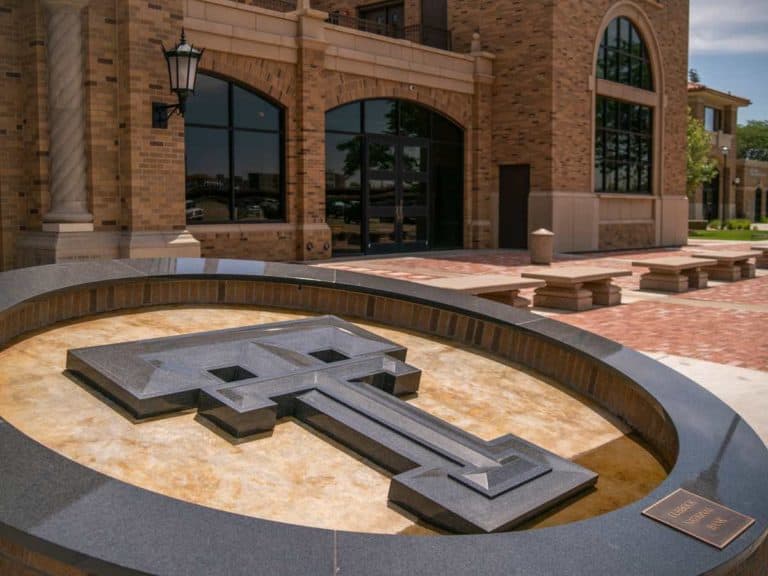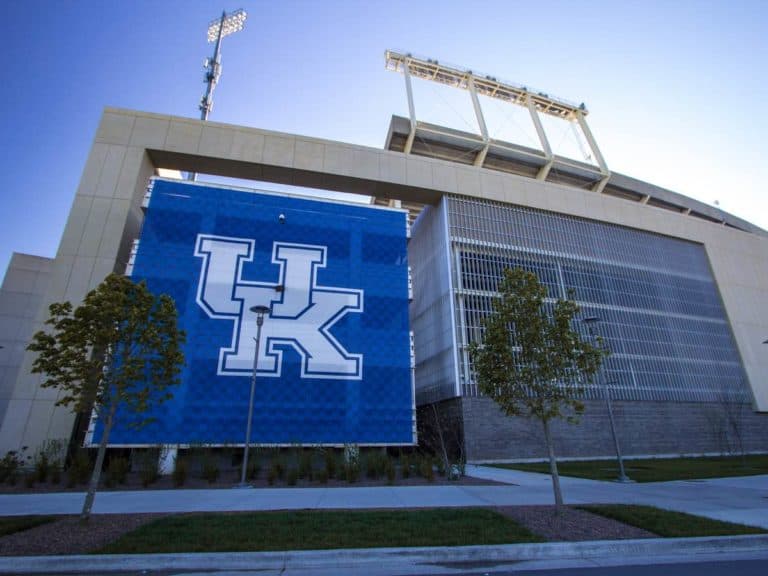Is the University of Kansas a Good School?
Flagship institutions are the best in their respective states.
Apart from offering a wide range of academic programs, they also have a compelling reputation for top-notch education, world-class research, and bringing the latest innovations.
The University of Kansas is the flagship school of Kansas.
It’s an R1: Doctoral University (very high research activity), making it wonderful for students looking to discover something relevant and new with the help of campus resources and faculty mentors.
Located in Lawrence, Kansas, KU is also suited for those who want to get their hands on first-rate undergraduate engineering, computer science, and business programs.
With superb extracurriculars, sports, and Greek life, campus living is exciting and full of opportunities.

Number One in Kansas
KU is one of the best in the US and the top in Kansas.
Well, that’s as far as some college rankings go.
For instance, among 22 surveyed institutions in the state, Niche ranks it not only #1 in Best Colleges in Kansas but also #1 in Colleges with the Best Academics in Kansas.
It also ranks it #1 in Top Public Universities in Kansas (out of eight surveyed institutions).
Countrywide, KU is #151 in National Universities and #80 in Top Public Schools in US News’ eyes.
Fantastic news for retired American soldiers and their dependents who wish to further their education: US News also ranks KU #104 in Best Colleges for Veterans.
KU appears in a couple of listings by The Princeton Review:
- The Best 389 Colleges
- Best Midwest
Academics at a Public Research University
KU offers 420+ degrees and certificates in its 14 colleges and schools.
With an acceptance rate of 88%, most applicants get in — those who attain admission success have an average GPA of 3.7 and composite test scores of 1090 to 1340 (SAT) and 21 to 28 (ACT).
Speaking of which, KU is a test-optional school.
However, its admissions officers highly recommend test score submission as it can add value to college applications and may also be used in the admission process for competitive programs.
Improving your GPA and test scores helps increase your chances of getting in.
Yes, these two criteria are the only ones that KU’s admissions officers look at during the review process — they do not care about things like class rank, recommendation letters, and the rigor level of your high school record.
Various non-academic factors like extracurriculars, volunteer work, and residency don’t matter.
Business and Engineering: The Most Popular Majors
With more than 190 majors available, running out of options should not be a concern.
Numerous programs in the College of Liberal Arts and Sciences do not have prerequisites for declaring a major, although meeting with an advisor is strongly suggested for creating a path toward graduation.
On the other hand, if the degree program requires the completion of coursework of a specific major, you have no choice but to declare one — during application or after admission.
Here are some of KU’s top academic majors:
- Business
- Engineering
- Biological Sciences
- Psychology
- Nursing
- Journalism
- Parks and Recreation
- Social Sciences
- Visual and Performing Arts
- Computer Science
- Education
Flexible Learning Through Jayhawk Global
The University of Kansas administers online programs through Jayhawk Global.
Almost 20 online bachelor’s degree programs are available, most of which can be completed 100% via the web — yes, you won’t have to go to a physical classroom even once.
Undergraduate programs you can take virtually through and through are the following:
- Anthropology
- Applied Cybersecurity
- Communication Studies
- Criminal Justice
- Exercise Science
- Health Information Management
- Health Sciences
- Information Technology
- Liberal Arts
- Professional Studies
- Data Analytics Concentration
- Project Management
- Psychology
- Respiratory Therapy
- RN to BSN
- Sociology
- Women, Gender and Sexuality Studies
However, one bachelor’s degree program online is the hybrid kind: Operations Management.
Besides those in the said online program, all Jayhawk Global courses are asynchronous.
It means you can attend virtual classes on your own time, thus keeping an adult learner’s undergraduate pursuit from getting in the way of everyday duties and responsibilities.
My experience at the University of Kansas has been relatively average. They have a weak support system in terms of services. As well, my program is underfunded yet I have the same in tuition as other programs. In my lecture hall, there are not any comfortable seats, refrigerators, microwaves, or any functioning microwaves.
Niche.com
Too Many Classmates, Sort of Too Few Teachers
In 2023, KU enrollment increased to 29,350+ students, the highest overall enrollment since 2010.
Indeed, it’s a big school population-wise.
Such is why it isn’t surprising that classes are big at KU — according to its most recent Common Data Set (CDS), approximately 28% of undergraduate classes have 20 to 29 students, while 6% have 100 plus or more.
But there’s hope for those who thrive better in intimate settings: 12% have less than 10 students.
The student-to-faculty ratio, on the other hand, is 17:1.
With the average student-to-faculty ratio at American colleges and universities being 14:1, the more than 1,770 instructional faculty members seem like they need to welcome additional co-teachers.
Undergraduate Research Opportunities
There are 11 research centers at KU.
It’s in these facilities where knowledge-seeking students and knowledge-disseminating faculty members meet. They do so to pursue research and reach out to the community to teach a broad range of topics.
Enhancing your undergraduate studies with research begins with knowing how to start a project.
Such is followed by securing funding (doing research often costs a lot of money!) and finding a mentor who will guide and support you in your quest for academic growth and personal development.
KU’s Center for Undergraduate Research (CUR) is the office to visit for everything research-related.
A Day in the Lives of the Jayhawks
Of its population (28,406) as of this writing, around 73% are undergraduates — approximately a quarter of all bachelor’s degree-seeking attendees are first-time, first-year students.
They spend their academic life on KU’s city campus, which measures 1,000 acres.
Overlooking the famed city of Lawrence, it’s at the top of Mount Oread, also known as The Hill. Over 125 areas and structures are within the premises, with many being steep in history and tradition.
Freshmen students are not required to live on campus.
While around 72% of first-time, first-year students chose to live in one of the nine residence halls, each accommodating 300 to 500 individuals, up to 73% of all undergraduates live off campus or commute.
KU is primarily a commuter school, and living on campus is not mandatory for first-year students.
I really love how diverse KU is! There are so many different people from different backgrounds! The professors genuinely care about you as a student! Everyone is very welcoming and kind!!
Niche.com
Party and Greek Life: KU Students Want to Have Fun
Are you wondering how much of a party school the University of Kansas is?
Allow the following impressive Niche rankings to give you a hint:
- #1 in Top Party Schools in Kansas
- #38 in Top Party Schools in America
Party options are almost everywhere on and off campus from Wednesdays to Saturdays, although you may come across a few raging ones nearly every night of the week if you keep your radar on.
If completing your bachelor’s degree on time is the most important thing on the planet and getting distracted isn’t an option, it’s a must to consider that KU is a huge party school.
Contributing to the outstanding social scene is the presence of Greek-letter organizations.
There are 41 fraternities and sororities at KU — around 4,000 undergraduates are members.
However, it’s worth noting that Greek life is not only about partying and drinking, given that each frat and sorority must also abide by the rules and mission of the four councils that govern them.
Here are the five core values of KU’s fraternity and sorority life:
- Academic achievement
- Civic and community engagement
- Diversity and inclusivity
- Personal and professional development
- Holistic wellness
Participate in the NCAA or Club Sports
Like parties and Greek life, sports are also a big part of the campus experience.
So much so that Niche ranks KU #60 in Best Colleges for Student Athletes in America and #27 in Best College Athletics in America, and a couple of list-topping local ones:
- #1 in Best Colleges for Student Athletes in Kansas
- #1 in Best College Athletics in Kansas
There are 18 varsity teams, and they’re called the Kansas Jayhawks or simply Jayhawks.
Proudly donning crimson and blue jerseys, the Jayhawks compete in the National Collegiate Athletic Association (NCAA) Division I and the Big 12 Conference.
All in all, KU has 13 national championships under its belt.
Here are the sports that the Jayhawks prove to be unstoppable at:
- Basketball
- Cross-country
- Indoor track and field
- Outdoor track and field
Believe it or not, not being a being a varsity team member need not prevent you from competing.
You can through KU’s Sports Club program, created to meet the sporting interests of students, faculty, and staff members. The Recreation Services guides the different clubs under the said program.
I find the following currently existing clubs at KU quite interesting:
- Badminton
- Crew
- Disc golf
- Jiu-jitsu
- Quadball
- Rock climbing
- Sailing
- Taekwondo
- Water skiing
Interests and Identities Meet Through Student Clubs
Besides those under KU’s Sports Club program, other clubs are also around.
With more than 600 groups and organizations, the inability to pursue your interests and hobbies and meeting like-minded individuals should be the least of your worries.
The University of Kansas campus is not the most diverse — it’s 69% white and only 26% minority.
However, there’s no need for students in the underrepresented groups to feel like they don’t belong. That’s because there are 100+ multicultural student groups around.
Partaking in extracurricular associations is not all about affirming your likes and your kind.
KU students who wish to volunteer and provide community service may approach the Center for Community Outreach (CCO) for civic and community engagement opportunities.
Disclaimer: The views and opinions expressed in this article are those of the authors and do not necessarily represent those of the College Reality Check.





